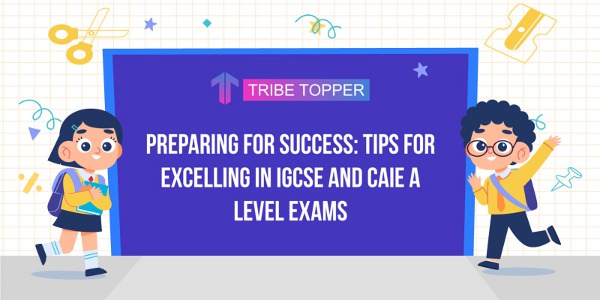For students who want to flourish academically, studying for the IGCSE and CAIE A-level exams can be exciting yet challenging. The IGCSE and CAIE A-level diplomas are well-known and highly esteemed and can be used to access higher education and prospects. It’s critical to approach your IGCSE and CAIE A-level exams with a well-planned study strategy and efficient study practices to increase your chances of success.


This thorough tutorial delves into the fundamental ideas and helpful hints for studying for the IGCSE and CAIE. This guide will give you insightful information and exam-winning tips with IGCSE Past Paper, whether you are just starting your journey or looking to improve your current study habits.
10 Studying Tips for IGCSE and A-level Exams:
These exams are significant turning points for students pursuing the IGCSE and CAIE Boards. For these exams, successful study methods and preparation are essential. We have prepared ten excellent tips on studying properly and improving your performance to help you do well on your board exams. These techniques will improve your exam results and your grasp of the subjects.
1. Recognize the Exam Structure and Syllabus
First, make sure you are completely familiar with each subject’s exam structure and material. Learn the exam’s layout, including the amount and types of questions, the allotted time, and the marking criteria. Look at the syllabus to determine the subjects and ideas that will be covered. This will assist you in organizing your study time and routine.
2. Make a study schedule
A thorough study plan should be created for efficient exam preparation. To establish a well-balanced study schedule, create a timetable with specific periods for each subject. Set realistic goals for each study session and arrange the material according to importance and degree of difficulty. To prevent burnout, remember to incorporate regular breaks into your study regimen.
3. Make use of active learning strategies
Reading passively is not a productive study strategy. Instead, adopt active study techniques to aid in memory retention, such as underlining key points, taking quick notes, and using mnemonic devices. Engage with the subject by summarizing ideas in your own words, discussing them with peers, or imparting knowledge to others. These methods will improve your comprehension and aid with memory during the exam.
4. Past-paper practice and mock exams
Practice with past tests and mock exams is one of the best ways to prepare for these exams. You’ll become more acclimated to the format of the exam, improve your time-management skills, and be able to identify your weak points. Improve your exam technique and material understanding by reviewing the sample answers, analyzing your performance, and learning from errors.
5. Seek Assistance & Clarification
If you have trouble comprehending a given issue, don’t hesitate to ask for clarification or help. Ask your instructors, peers, or online resources for more information or examples. Work in study groups to discuss challenging concepts and share expertise. Remember that addressing your questions and receiving guidance will increase your confidence and understanding.
6. Produce Visual Supports
Visual tools like mind maps, flowcharts, and diagrams can help you organize and clarify complex material. They allow you to remember things and make connections between different ideas. For each subject, create visual aids to help you remember important concepts and make revision more interesting and productive.
7. Develop time management skills
The IGCSE board and CAIE A-level examinations require excellent time management. You can develop a feeling of time by preparing under test settings, following time constraints, and imitating the exam atmosphere. This will enable you to maintain a steady pace during the tests and ensure you have enough time to answer each question. Plan time for revision, breaks, and rest in your study schedule to maintain a healthy balance.
8. Maintain Your Health and Manage Stress
For the best exam results, a healthy lifestyle must be maintained. Sleep well, eat decent meals, and exercise frequently to keep a healthy mind and body. Utilize relaxation methods to reduce stress, such as meditation, deep breathing exercises, or engaging in activities you enjoy. Taking care of yourself will enhance your focus, concentration, and performance.
9. Regularly revise
The secret to remembering information and solidifying your comprehension is constant review. Please go through the material regularly rather than trying to memorize it all at once. Set aside time specifically for revision, particularly for difficult subjects or topics by practicing CAIE A Mock Paper. Examine your summary, flashcards, and notes, and actively test your understanding by answering practice questions. You can strengthen key ideas, pinpoint areas needing development, and develop knowledge confidence by revising frequently.
10. Take breaks and take care of yourself
While studying is necessary, taking breaks and caring for oneself are just as important. Pushing yourself too hard without taking breaks might make you burn out and reduce your productivity. Include brief intervals for relaxation and recharging in your study regimen. Take part in enjoyable activities you enjoy, such as watching movies, taking walks, or spending time with loved ones. You’ll approach your tests clearly if you care for your mental and emotional well-being.


























